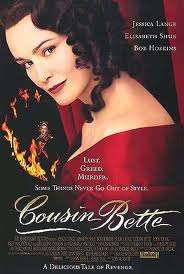Cousin Bette (1998 film)
Cousin Bette is a 1998 British–American comedy-drama film starring Jessica Lange in the title role and is loosely based on the novel Cousin Bette by the French author Honoré de Balzac. [1]
| Cousin Bette | |
|---|---|
 Theatrical release poster | |
| Directed by | Des McAnuff |
| Produced by | Sarah Radclyffe |
| Written by | Honoré de Balzac (novel) Lynn Siefert Susan Tarr |
| Starring | |
| Music by | Simon Boswell |
| Cinematography | Andrzej Sekuła |
| Edited by | Tariq Anwar Barry Alexander Brown |
| Distributed by | Fox Searchlight Pictures |
Release date |
|
Running time | 108 minutes |
| Country | United Kingdom United States |
| Box office | $1,161,063 |
Plot
The wealthy Hulot family gathers at the deathbed of their matron Adeline (Geraldine Chaplin). Adeline's husband, the Baron Hector Hulot (Hugh Laurie) has squandered their fortune on an extravagant string of mistresses and plunged them heavily into debt, a fact which stresses the entire family.
Adeline's Cousin Bette (Jessica Lange), a poor and aging spinster, has spent her life supporting Adeline and her family with little return, and promises the dying Adeline that she will watch over the family, especially Adeline's young, unmarried daughter, Hortense (Kelly Macdonald). Because they were poor as children, their family chose to sacrifice Bette and launch only Adeline into an advantageous marriage due to her greater beauty, a fact which has caused Bette much hardship and regret in life.
Believing the death of Adeline to result in reward at last, Bette is stricken and infuriated when what she believes to be a proposal of marriage and an offer of a true place in the family from Baron Hulot is, in fact, an offer of employment to work as their (unpaid) housekeeper.
Bette returns to her humble apartment and continues her meager living as the costume maker for a Burlesque theater, where she becomes friends with the headliner of the show: the famed courtesan (and Baron Hulot's mistress) Jenny Cadine (Elizabeth Shue), and saves the life of a young and handsome sculptor living in her building—the displaced and impoverished Count Wenceslas Steinbach (Aden Young). Bette dotes on Wenceslas, giving him money, attention, and guidance. Under Bette's controlling eye, the lackadaisical young artist grows more successful and productive. Finding joy in her new companion, Bette tells her niece, Hortense, of her "sweetheart" Wenceslas and of her happiness.
Hortense, parched from a steady stream of ugly, dull, but wealthy, suitors, is intrigued by her aunt's romantic stories of the handsome artist who happens to be a lord and decides to hunt him down in secret and steal him away from her aunt for an affair. Preferring youth and beauty, the pair marry and Wenceslas accepts a prestigious art commission that would guarantee his major debut—if successful.
Bette views the theft of Wenceslas, whom she loved, as the final betrayal and vows revenge. Enlisting the aid of Jenny, Bette begins to manipulate the Hulot family into succumbing to their baser desires and court their own demises.
One after the other, they fall into ruin under Bette's subtle guidance. Baron Hulot suffers a debilitating stroke, Hortense finds herself in prison, Bette's nephew, Victoren, flees for his life from loan sharks, Wenceslas is left a dead mockery of an artist, and the family name is in shamed and impoverished tatters.
Bette ends the film successful and triumphant. Bette has amassed a small fortune and is now in control of the Hulot family's infant heir, whom she will raise as her own to be a great artist who returns her love.
Cast
- Jessica Lange – Cousin Bette
- Elisabeth Shue – Jenny Cadine
- Kelly Macdonald – Hortense
- Aden Young – Wenceslas
- Hugh Laurie – Baron Hector Hulot
- Bob Hoskins – Cesar Crevel
- Geraldine Chaplin – Adeline Hulot
- Toby Jones – Gentleman in Café des Artistes
- Laura Fraser – Mariette
- Toby Stephens – Victorin Hulot
Reception
Cousin Bette received mixed reviews from critics and it holds a 41% rating on Rotten Tomatoes based on 22 reviews. Jessica Lange received strong praise for her performance. Stephen Holden of The New York Times referred to the film as "it feels as rushed, overstuffed and devoid of texture".[2]
References
- John C. Tibbetts, and James M. Welsh, eds. The Encyclopedia of Novels Into Film (2nd ed. 2005) pp 77–78.
- "Movie Review :; She's Poor, Homely and Bent on Revenge". The New York Times. Retrieved 9 October 2017.
Further reading
- Tibbetts, John C., and James M. Welsh, eds. The Encyclopedia of Novels Into Film (2nd ed. 2005) pp 77–78.